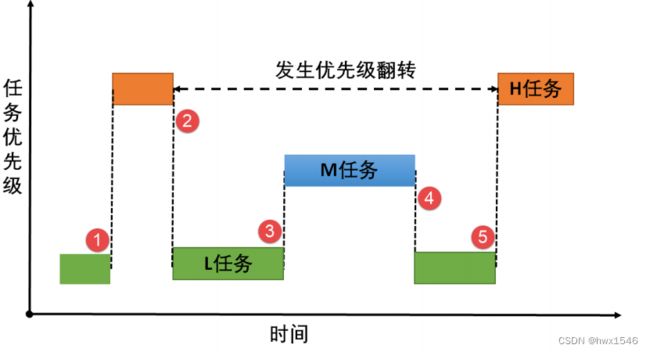STM32F4X UCOSIII 互斥量
STM32F4X UCOSIII 互斥量
- 互斥量的概念
- 互斥量的工作机制
-
- 洗手间问题
- 互斥量优先级继承
-
- 没有优先级继承
- 优先级继承
- UCOSIII互斥量API
-
- 互斥量创建函数
- 互斥量删除函数
- 互斥量申请函数
- 互斥量释放函数
- UCOSIII 互斥量例程
互斥量的概念
UCOSIII中的互斥量是一种特殊的信号量,它的本质也是一种信号量,不具备信息传递的功能。互斥量的主要作用是可以实现共享资源的互斥访问,提供优先级翻转机制。当一个任务持有互斥量时,除非该任务主动释放互斥量,否则其他任务都申请不到该互斥量。
互斥量的工作机制
洗手间问题
我们可以用一个实际的例子来说明一下互斥量的应用场景。假设有一个洗手间,洗手间里面有一把锁,假如现在游客A要进入洗手间,进入洗手间之后把锁锁上了,这时游客B也想进入洗手间,但是因为此时已经有人在洗手间,所以游客B无法进入,所以此时游客B只能在门外等,一直等待游客A上完洗手间之后,把锁打开,游客B才可以进入。
在上面的例子中,洗手间是共享资源,洗手间里面的锁是互斥量,游客A和游客B是两个任务。游客A上锁相当于是任务A申请互斥量,游客B等待相当于是任务B阻塞,游客A打开锁相当于是任务A解锁。
互斥量优先级继承
互斥量跟信号量非常类似,但是互斥量比信号量多了一个优先级继承的机制,下面可以通过一个例子来进行说明。
没有优先级继承
假设系统中有3个任务,分别是低优先级任务L,中优先级任务M和高优先级任务H。

- 任务L在使用共享资源,此时任务H被唤醒,开始执行,但是任务L还没释放共享资源。
- 任务H也要使用共享资源,但是任务L还没释放,所以任务H在阻塞等待。
- 任务M被唤醒,任务M优先级比任务L要高,任务M被执行,任务L还没有释放资源
- 任务M执行完毕,归还CPU资源,任务L继续执行
- 任务L执行完毕,释放资源,此时任务H获取资源,开始执行。
从上面的例子可以看到,任务H是高优先级任务,但是等待时间过长,这对系统的实时性会造成一定的影响。
优先级继承
下面来看一下有优先级继承的效果,同样地也是假设系统中有3个任务,分别是低优先级任务L,中优先级任务M和高优先级任务H。

- 任务L在使用共享资源,此时任务H被唤醒,开始执行,但是任务L还没释放共享资源。
- 任务H也要使用共享资源,但是任务L还没释放,此时因为互斥量的优先级继承机制,任务L的优先级会被临时提升到跟任务H相同的优先级。
- 任务M被唤醒,但是因为任务M的优先级要比任务L的低,所以任务M处于就绪状态,没有被执行。
- 任务L运行完毕,释放资源,此时任务L的优先级会变成原来的优先级,任务H获取资源,开始运行。
- 任务H运行完成,释放资源,任务M开始运行。
- 任务M运行完毕,系统正常运行,按照设定好的优先级运行。
可以看到,当使用互斥量时,任务L的优先级会被临时提高,这样就可以保证一些高优先级的任务能够尽快运行,尽可能提高系统的实时性。
UCOSIII互斥量API
互斥量创建函数
/*
* p_mutex:互斥量对象
* p_name:互斥量名字
* p_err:错误代码
*/
void OSMutexCreate (OS_MUTEX *p_mutex,
CPU_CHAR *p_name,
OS_ERR *p_err)
互斥量删除函数
/*
* p_mutex:要删除的互斥量对象
* opt:用户选项
* p_err:错误代码
返回值: 等于0:删除成功
大于0:互斥量上有等待的任务
*/
OS_OBJ_QTY OSMutexDel (OS_MUTEX *p_mutex,
OS_OPT opt,
OS_ERR *p_err)
其中opt可以选择OS_OPT_DEL_NO_PEND和OS_OPT_DEL_ALWAYS。
-
OS_OPT_DEL_NO_PEND:删除互斥量如果该互斥量上有挂起的任务,则等待挂起的任务恢复才删除。
-
OS_OPT_DEL_ALWAYS:不管该互斥量上是否有挂起的任务,直接删除互斥量
互斥量申请函数
/*
* p_mutex:互斥量对象
* timeout:超时时间
* opt:用户选项
* p_ts:时间戳
* p_err:错误代码
*/
void OSMutexPend (OS_MUTEX *p_mutex,
OS_TICK timeout,
OS_OPT opt,
CPU_TS *p_ts,
OS_ERR *p_err)
opt选项可以选择OS_OPT_PEND_BLOCKING、OS_OPT_PEND_NON_BLOCKING
- OS_OPT_PEND_BLOCKING:阻塞等待互斥量。
- OS_OPT_PEND_NON_BLOCKING:不阻塞等待互斥量,如果任务等待时间超过设定的超时时间,任务会恢复并返回一个错误代码。
互斥量释放函数
/*
* p_mutex:互斥量对象
* opt:用户选项
* p_err:错误代码
*/
void OSMutexPost (OS_MUTEX *p_mutex,
OS_OPT opt,
OS_ERR *p_err)
opt选项可以选择OS_OPT_POST_NONE和OS_OPT_POST_NO_SCHED。
- OS_OPT_POST_NONE:释放互斥量不任何操作
- OS_OPT_POST_NO_SCHED:释放互斥量的同时不进行调度
UCOSIII 互斥量例程
/*
*********************************************************************************************************
* EXAMPLE CODE
*
* (c) Copyright 2013; Micrium, Inc.; Weston, FL
*
* All rights reserved. Protected by international copyright laws.
* Knowledge of the source code may not be used to write a similar
* product. This file may only be used in accordance with a license
* and should not be redistributed in any way.
*********************************************************************************************************
*/
/*
*********************************************************************************************************
*
* EXAMPLE CODE
*
* IAR Development Kits
* on the
*
* STM32F429II-SK KICKSTART KIT
*
* Filename : app.c
* Version : V1.00
* Programmer(s) : YS
*********************************************************************************************************
*/
/*
*********************************************************************************************************
* INCLUDE FILES
*********************************************************************************************************
*/
#include